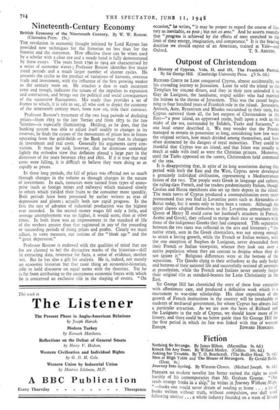Outpost of Christendom
RICHARD COEUR DE LION conquered Cyprus, almost accidentally, on his crusading journey to Jerusalem. Later he sold the island to the Templars for iocs000 dinars, and they in their turn unloaded it to Guy de Lusignan, the handsome, stupid soldier who had married the heiress to the throne of Jerusalem. This was the casual begin- ning to four hundred years of Frankish rule in the island. Jerusalem, Antioch, Acre, Byzantium and Rhodes succumbed in their turn, but Cyprus survived them all, the last outpost of Christendom in the East—" a poor island, an oppressed realm, built upon a rock in the midst of the sea, surrounded by Infidels, Turks and Saracens," as one local orator described it. We may wonder that the Franks managed to remain in possession so long, considering how few were the original settlers, how much divided among themselves, and how often distracted by the dangers of royal minorities. They could be thankful that Cyprus was an island, and that Islam was usually as much at odds with itself as were the Christian princes. Moreover, until the Turks appeared on the scenes, Christendom held command of the seas.
It is disappointing that, in spite of its long association during this period with both the East and the West, Cyprus never developed a genuinely individual civilisation, representing a Mediterranean fusion of the two. The people were Greek in language and culture, the ruling class French, and the traders predominantly Italian, though Catalan and Hansa merchants also set up their depots in the island. The main towns of Cyprus produced a cosmopolitanism even more pronounced than you find in Levantine ports such as Alexandria or Beirut today, but it seems only to have been a veneer. Although the upper classes adapted themselves to the Levantine atmosphere (the Queen of Henry II could curse her husband's attackers in French, Arabic and Greek); they refused to merge their race or manners with those of the indigenous Greeks they had conquered. TMs separation between the two races was reflected in the arts and literature ; " the native strain, seen in the Greek chroniclers, was not strong enough to attain a lasting growth, while the French or Italian writers, with the one exception of Stephen de Lusignan, never descended from their French or Italian viewpoint, whence they look out over a native population whom they are content to despise when they do not ignore it." Religious differences were at the bottom of the separation. The Greeks clung to their orthodoxy as the only badge and buttress of their national life and successfully resisted all attempts at proselytism, while the French and Italians never entirely forgot their original role as standard-bearers for Latin Christianity in the East.
Sir George Hill has chronicled the story of these four centuries with affectionate care, and produced a definitive work which is a monument to war-time scholarship. His clear exposition of the growth of French institutions in the country will be invaluable to students of mediaeval government, for whom Cyprus has always had a particular attraction. As we are now the heirs of • Richard and the Lusignans in the rule of Cyprus, we should know more of its history, and tilers could be no better guide than Sir George Hill for the first period in which its fate was linked with that of western






























 Previous page
Previous page